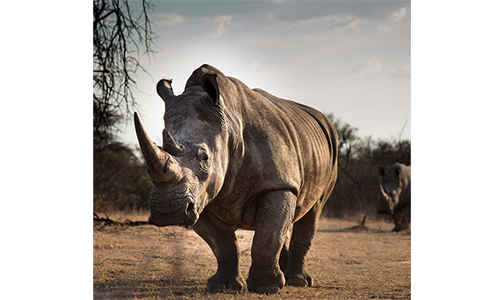Lahja Nashuuta
Private rhino owners are taking extraordinary steps to protect their animals following an increase in poaching incidents, including the brutal killing of a rhino cow in the Hardap region earlier this month.
The Ministry of Environment, Forestry and Tourism (MEFT) has confirmed that 15 rhinos and one elephant have been poached across the country so far this year.
In response to growing concerns, a private rhino owner has offered a N$160 000 reward for information leading to the arrest and successful prosecution of those behind the Hardap incident. The rhino cow was found shot and dehorned between 9 and 11 May 2025 on a farm near Maltahöhe.
“This was not just a crime against wildlife, it was a crime against conservation,” said Ministry of Environment and Tourism spokesperson Ndeshipanda Hamunyela in an interview with New Era this week. “Private rhino owners are taking extraordinary steps to protect their animals, and we fully support their efforts.”
Haingura announced that MEFT will release a bi-annual wildlife crime report in June, which will include updates on poaching statistics, arrests, seized items, and law enforcement actions taken nationwide.
To enhance patrol efficiency and intelligence gathering,Hamunyela said MEFT has deployed the Spatial Monitoring and Reporting Tool (SMART) in parks and conservancies. This digital system assists rangers in tracking movement patterns, collecting data, and responding more strategically to threats.
“We’re integrating technology and training to stay ahead of poachers, who are becoming increasingly sophisticated,”Hamunyela said.
Additionally, Namibia has made significant investments in capacity building whereby a specialised training centre was established to equip rangers with advanced anti-poaching skills.
“A canine detection unit has been launched to assist in tracking poachers, uncovering weapons, and detecting illegal wildlife products,” she reveals.
While the Wildlife Protection Services Division, operating under MEFT, continues to lead on-ground operations in high-risk zones.
Furthermore, Namibia recently inaugurated the Environmental Wildlife Crime Court in Otjiwarongo. The court, operating under the Office of the Prosecutor General, is dedicated exclusively to prosecuting wildlife crimes.
“Swift and effective prosecution is essential in deterring would-be poachers,” said ,Hamunyela. “This dedicated court is a milestone in our legal approach,” she reveals.
Namibia also relies heavily on the Blue Rhino Task Team, a joint operation comprising MEFT, the Namibian Police’s Protected Resources Division and the Namibian Defence Force. The team focuses on intelligence-led operations to dismantle poaching networks and intercept wildlife traffickers.
“The Blue Rhino Task Team has proven instrumental in uncovering syndicates and halting poachers before they strike,” she noted.
Hamunyela stressed that combating wildlife crime is not a government task alone.
“We need all hands on deck; government agencies, the private sector, communities, and conservation partners,” she said. “Together, we can create a protective shield around our wildlife” she mantained.
-lnashuuta@nepc.com.na



